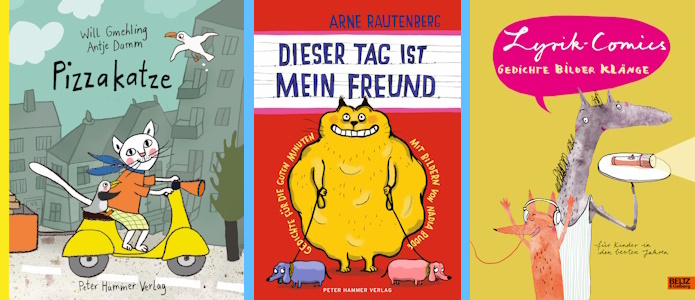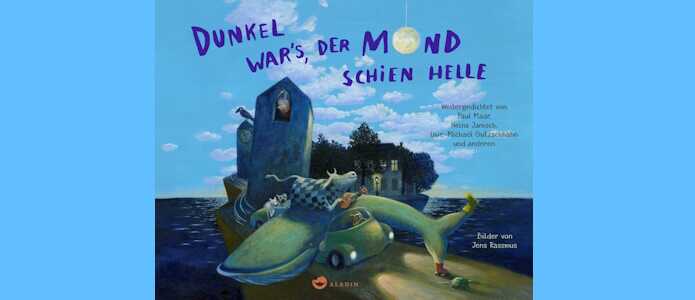Book Market
“An elephant with seven trunks Scoffed grub prepared by seven monks” *

by Antje Ehmann
Over the last five years a lot has happened in the field of poetry for children. James Krüss, Christian Morgenstern, Erich Kästner and Ernst Jandl are the classic authors who immediately come to mind in this context. But there are also plenty of contemporary writers who are dedicated exponents of the genre. In order to do proper justice to this development various major institutions in the German-speaking lands have now decided to publish specific ‘Recommendations of poetry for children’. Eleven books have been chosen, and will be announced on World Poetry Day. This gives us a welcome opportunity to take a look at five significant poetry formats.
Antje Damm has previously illustrated Die schönsten Gedichte für Kinder (Insel Bücherei no. 1490; ‘The finest poems for children’), and now she has provided cheerful, zesty, brightly illustrated double-page spreads for Will Gmehling’s Die Pizzakatze (‘The Pizza Cat’). In the words of the well-known artist herself: ‘This poetic rap was so open and free that it made me really keen to explore the possibilities that it presented. I adored the rhythms and the word-play.’ Indeed a song has already appeared devoted to the figure of the Pizza Cat. But Will Gmehling has dreamt up various new tales centring on the popular pet. After all, isn’t everyone really hungry, and really keen on eating pizzas? - “Hulk and Hilda, Fritz and Fritza - all of them want tasty pizzas”. The catchy verses - sometimes in the form of rhyming couplets, sometimes as alliterative stave rhymes - are richly resonant and characterful. In the words of the multi-talented author Will Gmehling himself: ‘Children really love this stuff, as is clear to me whenever I do readings from Die Pizzakatze.’
The Kiel author Arne Rautenberg, winner of numerous awards, writes poetry for both adults and children. The Peter Hammer Verlag has already published several books of children’s poetry by Rautenberg and the incomparably brilliant Nadia Budde. In Dieser Tag ist mein Freund – Gedichte für die guten Minuten (‘This day is my friend – poems for happy moments’) he once again shows himself to be a past-master in the field. He deploys his poetic gift so adroitly and expansively. He can create comedy by simply altering a single letter, conjure up touching dialogues between a tree and its leaves, as in the poem leise liebe (‘quiet love’), or come up with new onomatopoeic coinages such as ‘klipp-klapp-klebchen’ in the poem ich ess sushi (‘I’m eating sushi’). ‘I wanted the title and subtitle of the book to provoke a good feeling right from the very start’, Rautenberg has remarked; ‘for people need to feel good when approaching madcap poetry - as the poems can then exert a more powerful effect.’

Poetry for children - anthologies
In the field of poetry for children the Berlin Kindermann Verlag with its series ‘Poesie für Kinder’ (‘Poetry for children’) is one publisher worthy of mention. The Beltz Verlag in Weinheim also has a venerable tradition in children’s poetry, initiated and decisively influenced by the late and highly regarded Hans-Joachim Gelberg with his anthology Großer Ozean – Gedichte für alle (‘The great ocean. Poems for everyone’). Working with the same publisher Stefanie Schweizer has meanwhile ventured something new by combining comics, poetry and music in her anthology Lyrik-Comics – Gedichte Bilder Klänge für Kinder in den besten Jahren (‘Poetry and comics – poems, pictures and songs for children in their prime’), with poems by well-known writers, including Michael Hammerschmid, Josef Guggenmos, Mascha Kaléko, Sarah Kirsch und Jutta Richter. In the very apt words of the jury in their explanation of why they included the book in their list of nominees for the 2020 German Young-Adult Literature Prize: ‘This innovative gesamtkunstwerk fosters a delight in poetry that is readily graspable and relatable.’
Nonsense poetry
The children’s poem Dunkel war’s, der Mond schien helle (‘Dark it was, and the moon shone bright’) is a classic example of nonsense poetry, and as writer Uwe-Michael Gutzschhahn has recounted: ‘Only a few years ago I merely had to mention the poem’s title when I was doing readings in schools, and the children, who knew the opening lines by heart, would immediately rattle them off.’ According to Gutzschhahn the poem was ‘folk poetry’ in the truest sense of the term. But that instant familiarity no longer obtains. And so it occurred to Gutzschhahn that it would be a good idea to extend the poem and to commission Jens Rassmus to illustrate the resultant 34 verses. This extended version is now available in Dunkel war’s, der Mond schien helle. Weitergedichtet von Paul Maar, Heinz Janisch, Uwe-Michael Gutzschhahn und anderen (‘Dark it was, and the moon shone bright’ - as continued by Paul Maar, Heinz Janisch, Uwe-Michael Gutzschhahn and others’). As Jens Rassmus has noted, ‘Poems are free, open and playful, and it is easy to work in the same spirit when creating illustrations. So I have tried here to draw pictures that catch all the poem’s absurdities.’ Thus we see such things as crocodiles in floods of tears, a man with a totally bald pate, and a Blue Whale coloured bright pink - all so lavishly celebrated by Jens Rassmus in vivid acrylic colours that they linger long in the reader’s mind.

Prizewinning books and international source-material for every age
In their book Vom Flaniern und Weltspaziern (‘On sauntering about and wandering the world’), Elisabeth Steinkellner und Michael Rohe - both of them acutely sensitive practitioners of their trade - have once again shown just how they appropriate the world and render it visible to their readers, namely as something inspiring, charming, astonishing and full of warmth. Start reading this book and one is immediately mesmerised by the stream of counting rhymes, sound poems and philosophical poeticisms. In Steinkellner’s own words: ‘My work on this book was special for me in
that I had set myself no formal boundaries and could therefore indulge to the full my delight in playing creative games with language.’ It is thus scarcely surprising that the book has been showered with prizes, including most recently a ‘Special Mention’ in the Poetry category of the 2022 Bologna Ragazzi Award. Anyone who enjoys encountering a new poem each week is extremely well-served by this perennial multi-language wall calendar, Kinderkalender mit Gedichten aus aller Welt (‘Children’s calendar with poems from all around the world’), selected and published by the
International Youth Library in Munich.
There is clearly a lot going on in the world of children’s poetry at the moment, and this is strongly reflected in Arne Rautenberg’s summation: ‘Children’s poetry is developing strongly, formally as well as thematically. It is still as playful as ever, but the playfulness is broader in scope, and more publishers are getting in on the act. That its stock has also risen very rapidly is clear from the forthcoming publication of ‘Recommendations of poetry for children’.’ Indeed it will be exciting to see which poems make the cut!
Antje Ehmann works as a freelance journalist, consultant and prize-juror in the field of children’s and young-adult literature.
* Adapted from Elisabeth Steinkellner, Schlagzeilen (Hört! Hört! Das Neuste aus der Welt!) (‘Headlines (Oyez! Oyez! The latest news from around the world!)’).
Translated by John Reddick
Copyright: © 2024 Litrix.de